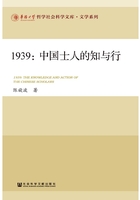
Abstract
This book demonstrates the creative writing representation,moral qualities and responsibilities that Chinese intellectuals presented and endured during wartime by closely investigating the micro-history of those knowledgeable Chinese intellectuals and their noble conduct in 1939,trying to bring insight into the universal psychological features and behavioral characteristics of Chinese scholars from various carefully selected cases,and thus exposes the Chinese cultural and ideological context of year 1939.
In 1939,Chinese scholars actively participated in the anti-Japanese and national salvation campaign. They either fought fiercely in the front line in the anti-Japanese war,or contributed their knowledge and talents to the military and political departments and other anti-Japanese organizations,or worked hard to carry out anti-Japanese propaganda. More importantly,they took the revitalization of Chinese academic culture as their responsibility and created a vigorous atmosphere in the fields of education,academia,literature and art in wartime. This book analyses eight cases. The Yellow River Chorus emphasized the symbolic signs of the Chinese nation and the Yellow River within the standard framework of Western music. Its lyric creation and its use of musical instruments were deliberately adapted from tradition. Xiong Shili's philosophical thinking in Fuxing Academy,on the one hand,absorbed the nutrition from Western epistemology,on the other hand,it carried on the ancient Chinese philosophical tradition,such as learning for application. Master Taixu hoped to revitalize Mahayana Buddhism's spiritual power of salvation . His travel in Southeast Asia and South Asia displayed the traditional style of Chinese scholars who were compatible with Confucianism and Buddhism and naturally assumed social responsibilities at a critical moment. Historian Liu Jie's thoughts and deeds reflected the spiritual characteristics of the traditional scholars. The sentiments of his deep worries about the family,nation,friendship,academic pursuit and literati feeling embodied in his diary of 1939 were in line with the spirit of scholars. Fei Ming's critical reflection on the local society revealed the vitality of the traditional countryside. Yu Ling reflected the spiritual awakening of the traditional gentry through the urban narrative of the isolated Shanghai. Wang Dulu eulogized the nobility of gentlemen with Chinese martial arts tradition and expressed his anti-Japanese sentiment with the subtle rhetoric of Chinese culture. Overseas Lin Yutang re-explored and discovered the Taoist spirit and strengthened the life value of family traditional ethics,thereby uniting the nation's anti-Japanese forces.
With the micro-history as a “magnifying glass”,the historical essence of cultural consciousness and cultural confidence of Chinese intellectuals in wartime is fully demonstrated.
Keywords:1939 Chinese Scholars Anti-Japanese War Chinese culture